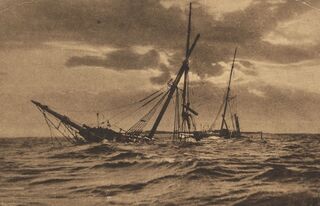Fantasies
How to Cope with Bad News, the Stoic Way
Three powerful mind exercises for dealing with bad news.
Posted April 16, 2022 Reviewed by Kaja Perina
Key points
- The founder of Stoicism only came to philosophy after suffering a shipwreck.
- As the first Stoic, Zeno of Citium advocated a number of cognitive reframing techniques for coping with adversity.
- In this article, we imagine how he might have dealt with his shipwreck had he then already been a Stoic.

Zeno (b. 334 BCE), the founder of Stoicism, hailed from Citium (modern-day Larnaca) in Cyprus, and may have been of Phoenician origin. As a young man, Zeno set sail from Phoenicia with a cargo of imperial purple, a dye obtained by crushing sea snails. Unfortunately, he lost this precious cargo in a shipwreck, and wound up in Athens with little more than the clothes on his back, if even that.
Now fully recovered from his ordeal, Zeno visited an oracle and asked what he should do "to live the best life." The oracle replied cryptically that he ought to “have conversation with the dead." Interpreting this to mean that he ought to take up the study of ancient authors, he began frequenting a bookshop in the agora, the central square of Athens. One day, Zeno picked up a copy of the Memorabilia, a collection of Socratic dialogues by Xenophon. Struck by Xenophon’s portrayal of Socrates, he asked the bookseller where such men might be found. At that very moment, the Cynic philosopher Crates of Thebes happened to be passing by. The bookseller pointed to him and said, “Follow yonder man.”
After agreeing to take him on, Crates gave Zeno a pot of lentil soup to carry across the Kerameikos, the potters’ quarter of Athens—a basic Cynic exercise for cultivating “shamelessness”, or disregard of popular opinion. Unused to such menial tasks, the self-conscious Zeno attempted to hide the pot under his cloak as best he could. Seeing this, Crates broke the pot with his staff, and Zeno darted off into the distance with lentil soup dripping down his legs. Crates called after him: “Why run away, my little Phoenician? Nothing terrible has befallen you!”
The incident with the pot of lentils suggests that Zeno, in those early days, was still a long way from wisdom. But how might he have dealt with his shipwreck had he then already been a Stoic? In other words, how might he have used reason to lessen his hardship by putting it into proper perspective?
1. Contextualization
Zeno might have begun by contextualizing his hardship, like so: “If I or anyone undertakes a sea voyage, there is always a chance of a shipwreck. So it is hardly extraordinary, even to be expected, that after so many successful voyages I came to suffer a shipwreck. At least I came out unharmed, and still have many advantages and assets, not least my sound mind and education. Things could be a lot worse—for many people, they are. After all, I only lost my ship because I had one in the first place. What will my misfortune amount to in five or ten years’ time, let alone a hundred? Who will care about my cargo then? Who even cares about it now? Imperial purple, how ridiculous!”
2. Negative visualization
After contextualization, Zeno could have tried a technique called premeditatio malorum [Latin, “premeditation of future evils”], also known as “negative visualization,” which in his case would involve imagining the very worst that could now happen and hopefully realizing that even that isn’t so bad: “So, I’ve lost my ship and cargo. At best, my bottomry contract [shipping insurance in the ancient world] will cover my loans. At worse, I’ll have to sell some property to pay my creditors, and start over on a more modest scale. Is that really so terrible?”
3. Transformation
My favourite technique is transformation, which involves turning hardship into an opportunity—which is, of course, just what Zeno did by attaching himself to Crates and becoming a philosopher. Had Zeno not “suffered” a shipwreck, he would not have been the subject of this article. In fact, there would have been no article. Given the influence of Stoicism on the Founding Fathers, there may have been no America either. As Zeno later put it, “I made a prosperous voyage when I suffered a shipwreck.”
Neel Burton is author of Stoic Stories.
Related articles by the same author:


